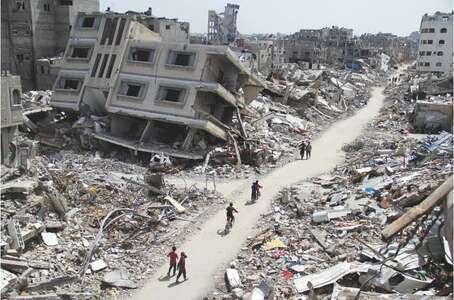
UNITED NATIONS: The UN Human Rights Council on Friday demanded a halt in all arms sales to Israel, highlighting warnings of “genocide” in its aggression in Gaza, which has killed more than 33,000 people.
Meanwhile, UN Secretary General António Guterres condemned the Israeli military campaign in Gaza, noting it has only brought “relentless death and destruction” to the besieged Palestinian enclave.
In Geneva, the 47-member UNHRC in a resolution presented by Pakistan on behalf of the Organisation of Islamic Cooperation noted that Israel was “using starvation of civilians as a method of warfare” in Gaza.
The resolution was adopted by 28 to 6 votes and 13 abstentions. The council backed a call “to cease the sale, transfer, and diversion of arms, munitions, and other military equipment to Israel, the occupying Power…to prevent further violations of international humanitarian law and violations and abuses of human rights”.
Guterres regrets Tel Aviv brings relentless death and destruction to Gaza
The resolution also underscored the need for stopping egregious human rights violations in the occupied Palestinian territory.
Co-sponsors of the text included Bolivia, Cuba, and the State of Palestine, ahead of the vote which saw support from more than two dozen countries, including Brazil, China, Luxembourg, Malaysia, and South Africa.
Death, destruction
At a news briefing in New York, UN chief Guterres said: “Over the last six months, the Israeli military campaign has brought relentless death and destruction to Palestinians in Gaza.”
More than 33,000 people were reportedly killed and over 75,000 others injured — the vast majority women and children, he regretted.
He declared that ‘nothing can justify the collective punishment’ in Gaza and urged Israel to allow “a quantum leap” in aid. “Lives are shattered. Respect for international law is in tatters,” Mr Guterres told journalists at the UN Headquarters.
The resulting humanitarian disaster, he noted, was unprecedented, with more than a million “facing catastrophic hunger”.
He pointed out that children in Gaza were dying due to a lack of food and water. “This is incomprehensible and entirely avoidable,” the UN chief said, reiterating that nothing can justify such collective punishment.
Weaponising AI
Mr Guterres said he was deeply troubled by reports that the Israeli military has been using artificial intelligence to help identify targets during its relentless bombing of densely populated areas of Gaza.
“No part of life and death decisions which impact entire families should be delegated to the cold calculation of algorithms,” he said.
AI should only be used as a force for good, not to wage war “on an industrial level, blurring accountability”, the UN chief added.
Branding the war “the deadliest of conflicts” in decades, he highlighted that 196 humanitarians, including over 175 UN staffers, have been killed, the vast majority serving with the Palestine relief agency UNRWA.
“An information war has added to the trauma — obscuring facts and shifting blame,” said Mr Guterres, noting that Israel was denying journalists entry into Gaza, encouraging disinformation to spread.
‘Tactics must change’
Commenting on the appalling killing of seven staffers of the World Central Kitchen, he said the main problem was not who made the mistakes but “the military strategy and procedures in place that allow for those mistakes to multiply time and time again.”
Emphasising the need to change the military strategy, he said: “Fixing those failures requires independent investigations and meaningful and measurable changes on the ground.”
Mr Guterres said Israel had told the UN that it was now planning to allow a “meaningful increase” in the flow of aid to Gaza.
Hoping that the increase in aid would materialise quickly, he warned that the failure to do so would be disastrous.
“Dramatic humanitarian conditions require a quantum leap in the delivery of life-saving aid — a true paradigm shift,” he added.
Recalling last week’s Security Council resolution, he said: “All those demands must be implemented. Failure would be unforgivable.”
Published in Dawn, April 6th, 2024













































Dear visitor, the comments section is undergoing an overhaul and will return soon.